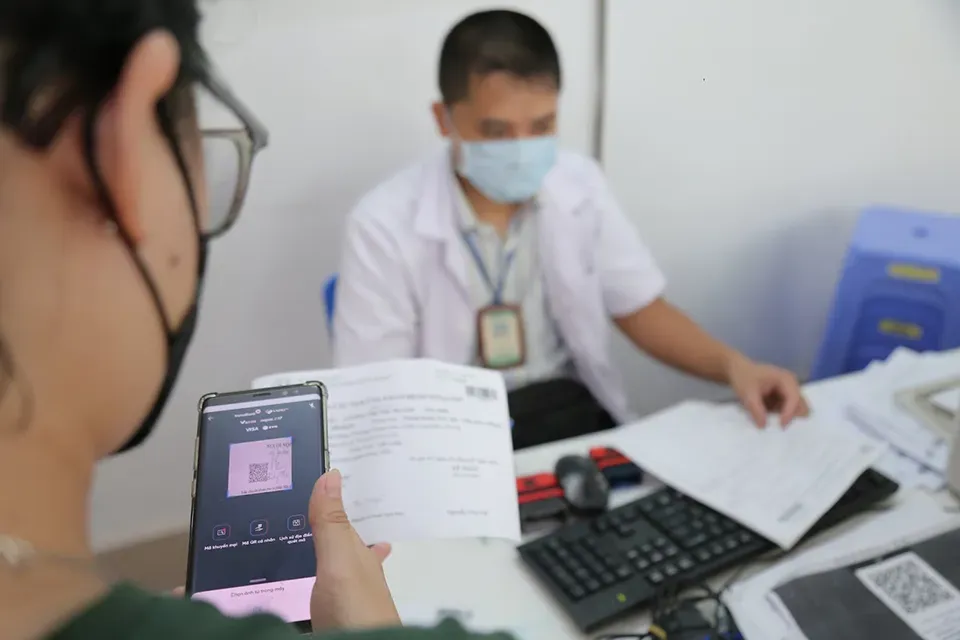Hanoi to adopt e-health records by late September
Hanoi's health sector has promoted the application of information technology and digital transformation to build a modern and professional health system.
THE HANOI TIMES — The Hanoi Department of Health has ordered medical facilities across the city to fully adopt electronic health records (EHR) by September 30 this year for convenient checkups and treatment.
"EHRs streamline the medical examination and treatment process by digitizing patient information from admission to discharge. They help save time for both doctors and patients, enhance transparency, and reduce risks for patients," Nguyen Khac Hoang, a cardiovascular patient treated at Duc Giang General Hospital, told The Hanoi Times.
According to Dr. Doan Van Phuc, Deputy Director of Duc Giang General Hospital, with EHRs, doctors can access all of a patient's medical information with a few clicks on the computer.
In the past, patients leaving the hospital often had to pay their hospital bills the next day. Now, they can do it the same day they are discharged, and the payment process is simplified with no waiting.

A patient registers for health check-ups using the VNeID application at Duc Giang General Hospital. Photo: Courtesy of the hospital
“Digital medical records are a system that manages all health information of people during the medical examination and treatment process at medical facilities, including personal information, medical examination history, test results, diagnostic imaging and prescriptions which are stored and continuously updated online,” Phuc told The Hanoi Times.
Sharing electronic health records across the healthcare network is one of the key tasks in the digital transformation strategy of Hanoi's medical sector, in line with national strategies, aiming to optimize management and improve the quality of healthcare services.
Saint Paul General Hospital has been piloting EHRs since 2021, deploying infrastructure, training staff, and guiding patients to digitize their medical records.
The hospital uses facial recognition for check-in. Patients' identities are authenticated the first time they register for an examination using a chip-embedded citizen ID card and health insurance card. From the second visit onward, they do not need to bring documents along, which helps to save time on procedures.
The success of digitizing medical records has relieved some of the pressure on Saint Paul General Hospital's medical staff.
Meanwhile, Van Dinh General Hospital in Ung Hoa District has been rolling out a synchronized hospital management system (HIS) since 2023, followed by the laboratory information management system (LIS), the medical image storage, transmission, and consultation system.

A staff member at Me Linh General Hospital in Hanoi's suburban Me Linh District instructs people how to use the automated registration system for medical check-ups. Photo: Pham Hung/The Hanoi Times
EHRs are expected to be integrated into the national e-identification application, VNeID, so that chip-based ID cards and citizen biometrics will also be used for health check-ups and online registration for healthcare services.
Healthcare organizations are also encouraged to share medical records, send referral requests, schedule follow-up appointments, and view past test results online, as well as promote telemedicine and e-prescribing.
The goal is that by the end of 2025, 100% of administrative procedures that meet legal requirements will be available online, while 80% of administrative records will be processed digitally. By the end of June this year, all administrative records should be linked to citizen identification.
The Hanoi Health Department has also asked medical institutions to increase the use of artificial intelligence (AI) and big data in diagnosis, treatment, and analysis, and promote cashless payment. AI has initially been tested at Saint Paul and Duc Giang General hospitals for medical examination and treatment, screening on X-rays, digestive endoscopy, and facial recognition to welcome patients directly into the examination room. In addition, medical facilities are piloting the use of virtual reality (VR) for psychological treatment and patient rehabilitation.
"EHRs help the medical sector build a complete, accurate, and timely health data system to help doctors give timely instructions on disease prevention, predict trends, and make appropriate guidelines," said Nguyen Dinh Hung, Deputy Director of the Hanoi Department of Health.











